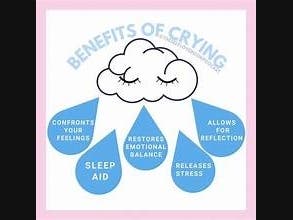Health & Fitness
Be Willing to Cry
To be willing to love includes being willing to cry. Tears can move us past pressure points, junctures of built-up stress and emotions.

To be willing to love includes being willing to cry. As the poet Gibran teaches, if you seek only love’s good times, if you are unwilling to bear love’s fullness, you are striving to live in a seasonless world, “where you shall laugh, but not all of your laughter, and weep, but not all of your tears.”
Tears and laughter can move us past pressure points, junctures of built-up stress and accompanying emotions. After a good laugh or cry, we are not in the same place that we were before our release. Tears reduce tension, flushing chemicals like manganese from our bodies, which build up when we are under stress. Tears also send through our system chemicals which elevate our mood and promote the sense of feeling better.
Tears cleanse. And sometimes we need a good emotional bath. They help us to let go of things, and to permit things to be the way they are. Tears move us toward acceptance, however difficult acceptance may be. Thus in grief situations, we may need to cry again and again, as we work towards letting go of a departed loved one, and accepting our altered life.
Find out what's happening in Across Americawith free, real-time updates from Patch.
Tears open the heart, rendering us vulnerable, susceptible to the touch of others. In this respect, tears are a form of reaching out to others, be it for support from them, or as a show of support for them. There is something essentially communal about tears, as there is about laughter. While some may prefer to cry alone, if their tears are to bring release, they need to cry to someone present in some way, be it only to the sensed, silent presence of God.
Why do women seem to cry more readily than men? Some would argue it is because women are healthier in their emotional life than men, better able to face and work through intense feelings instead of denying or suppressing them. Of course, as soon as one makes a general rule, specific instances contradict it; just so, there are men who cry easily and women who stifle their emotions. Yet generally speaking, women tend to process feelings more openly and directly than men. To put it the other way round: men tend to keep their emotions more to themselves, especially their tears and pain.
Find out what's happening in Across Americawith free, real-time updates from Patch.
The major reason usually given for this has to do with conditioning. Boys are taught not to cry: “crybabies” on school playgrounds or fields of sport are severely ridiculed. Recent research, however, suggests that there may be a biological basis for this difference between the sexes. It might well be physiologically easier for women to cry than men, due to hormones and other factors.
It is vital to the health of relationships that men and women give each other permission to process emotions in their own way. Neither is responsible for the emotional life of the other; neither should attempt to “fix” or change the other. Yet I have seen husbands criticize their wives for being too emotional and wives reprove their husbands for not being emotional enough. The issue here is not whether one is right and the other wrong, but how both can live in harmony together, respecting and communicating their differences.
You can give yourself permission to cry. And to cry in your own way, in your own time. Even if crying should produce only dry, not wet tears, they still give relief, release.